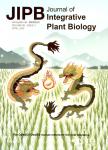Hydrogen sulfide regulates abiotic stress tolerance and biotic stress resistance in Arabidopsis
Hydrogen sulfide regulates abiotic stress tolerance and biotic stress resistance in Arabidopsis作者机构:Key Laboratory of Plant Germplasm Enhancement and Specialty AgricultureWuhan Botanical Gardenthe Chinese Academy of Sciences University of Chinese Academy of Sciences Institute of GeneticsState Key Laboratory of Plant Physiology and BiochemistryCollege of Life SciencesZhejiang University College of AgronomyXinjiang Agricultural University
出 版 物:《Journal of Integrative Plant Biology》 (植物学报(英文版))
年 卷 期:2015年第57卷第7期
页 面:628-640页
核心收录:
学科分类:0710[理学-生物学] 07[理学] 09[农学] 0903[农学-农业资源与环境] 071007[理学-遗传学] 0901[农学-作物学] 090102[农学-作物遗传育种]
基 金:supported by the National Natural Science Foundation of China(31370302) "the Hundred Talents Program"(54Y154761001076 and 29Y32963100263) to Zhulong Chan by the National Natural Science Foundation of China(31200194) Youth Innovation Promotion Association of Chinese Academy of Sciences(29Y42937100437) the Knowledge Innovative Key Program of Chinese Academy of Sciences(55Y45544600544) to Haitao Shi
主 题:Abiotic stress auxin receptor biotic stress cysteine desulfhydrase hydrogen sulfide MIR393
摘 要:Hydrogen sulfide (H2S) is an important gaseous molecule in various plant developmental processes and plant stress responses. In this study, the transgenic Arabidopsis thaliana plants with modulated expressions of two cysteine desulfhydrases, and exogenous H2S donor (sodium hydrosulfide, NariS) and H2S scavenger (hypotaurine, HT) pre-treated plants were used to dissect the involvement of H2S in plant stress responses. The cysteine desulfhydrases overexpressing plants and NariS pre-treated plants exhibited higher endogenous H2S level and improved abiotic stress tolerance and biotic stress resistance, while cysteine desulfhydrases knockdown plants and HT pre-treated plants displayed lower endogenous H2S level and decreased stress resistance. Moreover, H2S upregulated the transcripts of multiple abiotic and biotic stress-related genes, and inhibited reactive oxygen species (ROS) accumulation. Interest- ingly, MlR393-mediated auxin signaling including MIR393a/b and their target genes (TIR1, AFB1, AFB2, and AFB3) was transcrip-tionally regulated by H2S, and was related with H2S-induced antibacterial resistance. Moreover, H2S regulated 50 carbon metabolites including amino acids, organic acids, sugars, sugar alcohols, and aromatic amines. Taken together, these results indicated that cysteine desulfhydrase and H2S conferred abiotic stress tolerance and biotic stress resistance, via affecting the stress-related gene expressions, ROS metabolism, metabolic homeostasis, and MIR393-targeted auxin receptors.



